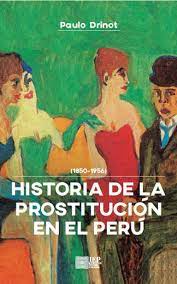HISTORY OF PROSTITUTION IN PERU, 1850-1956
Since the colony, prostitution was perceived as a danger to order, health, and morality. In the mid-19th century, under the influence of a new transnational movement, there were attempts to regulate it through the registration of prostitutes and their medical surveillance to protect the men who bought sex and, by extension, the nation.
These ideas, part of a broader “sexual question”, had their main triumph when the mythical Huatica was created in 1928, a red zone to which thousands of Peruvians would go for decades. This book tells the story of those efforts to regulate prostitution and control venereal diseases, as well as its evolution and subsequent crisis when a new paradigm began to take shape to deal with commercial sex: abolitionism.
It is a story marked by the ideas and actions of many actors, doctors, lawyers, police officers, and political authorities, but also anarchists, feminists, parents, pimps, and the women who sold sex and the men who bought it. When Did Prostitution Start?
Origins of prostitution
On more than one occasion we have read or heard that prostitution is the oldest "trade" of humanity. In the Sumerian records found, dating from 2400 BC, prostitution is mentioned as an occupation. They describe a "brothel" temple, run by priests, dedicated to the goddess Ishtar.
The historians Thucydides and Herodotus document the existence in Babylon of records indicating that "all women, at least once in their lives, must have sex with a foreigner as proof of hospitality in exchange for a symbolic payment ".
In Greece, prostitutes were classified into 3 categories: independent, straight (similar to a geisha), and sacred. Female slaves were "managed" and controlled by a pimp and the sale was called pornai (sex business: porne-pernemi ).
In Rome, prostitute means "to display for sale", lupa (she-wolf) is a whore, and a lupanar is a place for whores. The word fornices mean brothel or slum. The indication to enter the furnace, as it is still in Pompeii, is an erect stone penis, painted in vermilion red.
In Roman society, marriage is a private act. A century before or after our era, there were 5 to 6 million free men and women in Rome and about 1 to 2 million slaves (until the 3rd century, marriage was forbidden to them).
Getting married was a duty of the citizen, it was a "civic morality". The wife was "at the service" of the pater or head of the family. A husband is the owner of his wife, his children, and his servants. Why did he mention marriage? Because in that moral "must be" of the couple, the keyword for the Romans who wrote many works of the law is patrimony.
A father chooses his "offspring" as dowry and inheritance, as a way of guaranteeing what the "family" is capable of achieving: getting rich. For this reason, during this period, contraception, abortion, and adoption are common. The education of the males, whose "adulthood" begins at the age of 12, was in charge of pedagogues who came from wealthy classes; and its purpose was to "temper the character" so that when they reached adults they could avoid decadence and "vices". The teaching of oratory was essential, since reaching the Senate was the most prestigious career.
As Georges Duby expresses it in his book "History of private life" if there is a part of Greco-Roman life distorted by legend, it is to suppose that this society was "the Eden of non-repression in sexual matters, before the introduction of Christianity of the sense of "sin". That there were famous "libertines" like Caligula, Nero or Domitian, there were. But, in general, for Greco-Roman society, pleasures are dangerous for "virile energy". They reject "courtly love."
They do not "lose their minds" for love. The couple is "at the service of the owner's pleasure." This "slavery" is moralistic. Hence prostitution is "necessary." And a business, obviously. Women must pay taxes for their "trade". The pimps become "prosperous" merchants. And women slaves sold, without any kind of protection, usually die without anyone being able to claim for them.
Well, in a stretch of human history, since ancient times, the keyword is heritage. And the other terms used today clearly show why it is considered "a necessary evil" to justify an extraordinary source of income from a monstrous and dehumanizing network of those involved.


No comments yet